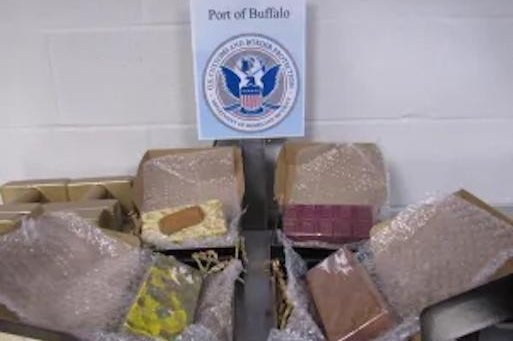U.S. Customs and Border Patrol said Friday that Port of Buffalo CBP officers found multiple commercial shipments of psilocybin in chocolate bricks in the previous 30 days.
Photo courtesy CBPOct. 11 (UPI) — U.S. Customs and Border Patrol said Friday that Port of Buffalo CBP officers found multiple commercial shipments of psilocybin in chocolate bricks in the previous 30 days.
The “magic mushroom” hallucinogenic drug was manifested as “chocolate and other food preparations.”
CBP said Friday a total of 15 seizures of psilocybin chocolate shipments weighing more than 20 pounds were seized throughout the past 30 days at the Peace Bridge warehouse in New York.
“Utilizing their training and experience, our CBP officers continue to intercept narcotic shipments,” said Area Port Director Gaetano Cordone in a statement. “All of our CBP employees work tirelessly each and every day to protect our country and communities from unregulated drugs that can become fatal to consumers.”
According to the Drug Enforcement Administration, “narcotics” “refers to opium, opium derivatives, and their semi-synthetic substitutes. A more current term for these drugs, with less uncertainty regarding its meaning, is “opioid.”
Psilocybin is not a narcotic or opioid, but is a DEA Schedule 1 controlled substance.
When people ingest psilocybin mushrooms, the “body converts it to another substance, psilocin,” according to the National Institute on Drug Abuse.
Psilocin attaches to and activates receptors, or binding sites, for the brain chemical serotonin and this is what causes “much of a person’s subjective experience when they take the mushrooms,” according to the NIDA.
According to the National Library of Medicine, “The U.S. Food and Drug Administration has granted two breakthrough therapy designations for psilocybin in treatment resistant depression in 2018 and major depressive disorder in 2019, as well as for MDMA for the treatment of post-traumatic stress disorder in 2017.”
A study published Sept. 13 by researchers at Emory University School of Medicine in Atlanta, the University of Wisconsin-Madison and University of California-Berkeley found psilocybin could benefit more than 5 million Americans in treatment for depression.
The National Institute on Drug Abuse reported in February that police seizures of “magic mushrooms” have more than tripled in the past five years.
The seizures went from 498 pounds in 2017 to 1,861 pounds in 2022.

